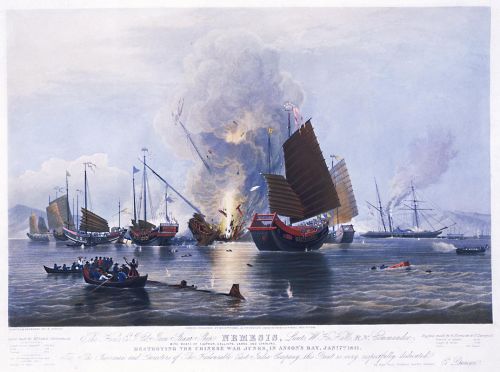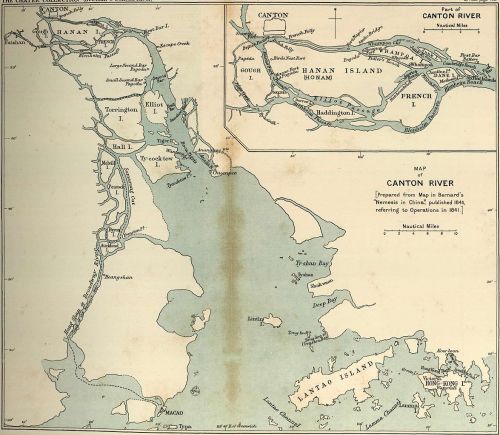In Poppy TearsA Poem by Rick PuetterThe first Chinese opium war The
British gunboat Nemesis, commanded by Lieutenant William Hall, destroying
Chinese war junks in Anson’s Bay on Jan 7, 1841. This image is in the public domain, and can
be seen at http://en.wikipedia.org/wiki/First_Opium_War -
mediaviewer/File:Destroying_Chinese_war_junks,_by_E._Duncan_(1843).jpg. In Poppy Tears "There were
opium dens where one could buy oblivion, dens of horror where the memory of old
sins could be destroyed by the madness of sins that were new"
--Oscar Wilde--The Picture of Dorian Gray (1891). In poppy tears they spent their lives-- In drug-numbed sleep they lay The outside world so desperate They swept those woes away
With all their strength they faced the world-- They did their very best But outside world was harsh and cold And poppy’s smoke sole rest In poppy tears they cry in dreams-- They’ll trade in woe one day They know but now a fantasy Life’s demons held at bay ***** ***** It was the year of thirty nine The nineteenth century The British Empire ruled the world And ‘ thirsty for its tea1 But China would not trade with them Silver the single plum With Spanish coin, pieces of eight With only this, tea won She
was quite meek, her name Min Lan The daughter of the cook Oh,
how her house had come to ruin And
how with tears she shook
For
father Bai, the pure, did fall To
opium’s delight Her
brothers, too, both Xing and Zhi Held
by the drug’s sheer might Trade needs a different currency Ah, use addiction’s grip Through greed and drug dependency All wealth from China strip “Disgrace and Sin,” said Eliot2-- A horrid, vile trade He did his best to end traffic With disrespect was paid Now
all the day she did the work Her
family not there For
opium, that pipe they’d smoke Their
world had not a care
And
after days, she’d have to go And
get her family She’d
feed them well and clean them up And also pay their fees Dauguang, the emperor, banned it, too Appointing Lin Zexu3 In Guangzhou now the trade was stopped And British tension grew And twenty thousand chests were seized Each more ‘ a hundred pounds At Chuanbi the chests destroyed Then flushed to ocean sounds Oh
what a life of pain she lived And
worse, there was no hope For
every day the same she’d see More
tears, then try to cope
Drug
merchants came into her shop They
knew she was alone And
rude remarks they threw at her Compassion
never shown In England and ‘ United States The people were outraged They read the news on printed page And prayed they’d not engage4 In Parliament, Lord Palmerston By Gladstone is denounced This “unjust and iniquitous” The Viscount thus was trounced And when they left she sighed relief She knew it could be worse She cried more tears, she calmed her fears Scenarios rehearsed
Under the desk hid butcher’s knife Meat cleaver by the light More weapons hid around the house She hid them out of sight The shallow drafted Nemesis5
With strong, thick iron sides With canon and its rockets dire It was the British pride! It would steam up the river mouth Nothing could block its way And junks were sunk and forts destroyed The British held all sway She knew it only would be time Before they came for her They’d grab and throw her on the floor A fate she’d not endure
And days did pass, then weeks and months With fear she filled the time With no one here to give her help Could she avoid this crime? In ’41 the Boque6 forts fall To canon and marines Then Guangzhou7 falls in but one day This city now the Queen’s Late ’42 the war was won This Pottinger’s8 fair prize And then Unequal Treaty9 signed This justice? No just lies! In
August came that fateful day Humidity
and heat Then several
men called out at her Stood
drinking in the street
And
then the men came through the door And
pulled it closed, behind With
loud and evil laughter shook And then pulled down the blinds ***** ***** In poppy tears they spent their lives-- In drug-numbed sleep they lay The outside world so desperate They swept those woes away With all their strength they faced the world-- They did their very best But outside world was harsh and cold And poppy’s smoke sole rest In poppy tears they cry in dreams-- They’ll trade in woe one day Their life now but a fantasy ...But it won't end that way
©2015 Richard Puetter All rights reserved
Opium
den circa 1890. Photographer unknown.
This image is in the public domain.
The original can be seen at http://en.wikipedia.org/wiki/Opium_den -
mediaviewer/File:Interior_chinese_lodging_house,_san_francisco.JPG
Notes The history of the two Chinese opium wars in the 1800’s
is fascinating and shows how absolute power corrupts. Detailed records, of course, survive from
these times and official communications and records are filled with rationalizations
for why the English were entitled to do what they did. The interested reader can find much more of
this on the web and in a number of engaging books. 1With the inception of the Canton trading
system in 1756, the British East India Trading Company had a monopoly on trade
with China. This was extremely lucrative
for them and for the thirteen chinese Hongs, with which they traded. At the time tea only came from China, and the
emperor would only trade with the western barbarians for silver. They would accept nothing else. So lots of silver was paid for tea, which was
extremely popular in England. One
amusing fact was that only the inferior black tea (fired and dried green
tea) was shipped to England since the superior green tea would spoil on the
trip to England. 2Charles Eliot went to China in 1834 as Master
Attendant to Lord Napier, the Chief Superintendent. He became the Chief Superintendent in 1836 and retained that
position until he was relieved by Sir Henry Pottinger in June of 1843 as he was
thought to be too favorable to the Chinese.
He was repulsed by the trade in opium which at it height had 90% of the
coastal population addicted to the drug. 3In 1839, Daoguang appointed Lin Zexu as the governor
of Canton, who banned opium on his arrival in Guangzhou (Canton). This was the beginning of the serious
confrontation between China and England that, with the destruction of 20,000
chests of seized opium (each containing 130-150 lb of opium), led directly to
the first opium war. This was about ½ of
the yearly import of opium in 1939. It
was Eliot that convinced the western traders that England would reimburse them
for the opium. This didn’t happen. Eventually with the Unequal Treaty, China
would pay for the opium along with the cost of the war. At the time, high quality opium was worth up
to four times its weight in silver (let’s say 2x on average). So this amounted to over 5 million pounds of
silver coin, which were commonly 0.9 pure silver. Today, pure silver trades for about $16 per
ounce. So you do the math and see why
this was a big deal. 4The war was hotly debated in England at the United
States. Famously, Lord Palmerston (Henry
Temple, the 3rd Viscount Palmerston), British Foreign Secretarty,
was publically denounced in Parliament by young William Gladstone, who would go
on to serve as Prime Minister four times and also four times as Chancellor of
the Exchequer. 5The Nemesis, was a steam powered paddleboat that was
heavily gunned, iron-clad, and had a shallow 6 ft draft, making it perfect for
river warfare. Successful use of such
superior ships and gunnery would eventually lead to the expression “gun-boat
diplomacy”. Eliot was aboard the Nemesis
for most of its battles when he was in China. 6Chinese forts at the mouth of the Pearl river. 7Canton 8Sir Henry Pottinger, Lieutenant General, in
1843 Chief Commander of the British troops in Hong Kong, sent in to replace
Eliot and conduct war with China. 9The Unequal Treaty (The Treaty of Nanking),
was signed after the fall of Shanghai, on August 29, 1842, ending the first
Opium War. In this treaty, among other things, the British gain the right to be
governed by British law in China, the Chinese pay for the destroyed opium, they also pay all the war costs of the British, and the British gain possession of
Hong Kong.
The mouth of
the Pearl river, showing Hong Kong and Canton.
Original: 1175px-Map_of_Canton_River.jpg. This
image is in the public domain. Source:
James Orange (1924). The
Chater Collection: Pictures Relating to China, Hongkong, Macao, 1655-1860.
p. 144. http://commons.wikimedia.org/wiki/File:Map_of_Canton_River.jpg © 2020 Rick PuetterFeatured Review
Reviews
|
Stats
4399 Views
30 Reviews Shelved in 5 Libraries
Added on February 23, 2015Last Updated on July 23, 2020 Tags: opium, war, opium war, Chinese history, British history, The Nemisis AuthorRick PuetterSan Diego, CAAboutSo what's the most important thing to say about myself? I guess the overarching aspect of my personality is that I am a scientist, an astrophysicist to be precise. Not that I am touting science.. more..Writing
|



 Flag Writing
Flag Writing